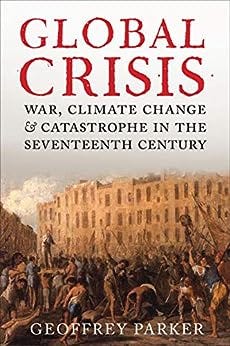From Peter Nimitz' Nemets substack, September 3:
Upheavals from Spain to the Yangtze
Civilization is old - at least 11,700 years old - and has risen and fallen at least six times. Each of those falls was an apocalypse in the biblical sense. Cities were destroyed or abandoned, productive lands were turned into deserts, cultural sophistication regressed to primitive artisanry, barbarian warlords overthrew law, and human populations fell dramatically. The Fall of Rome was one of those apocalypses, with western Eurasian civilization only barely hanging on in Constantinople under the Byzantines and in the Levant under the Umayyads.
Interspersed between the apocalypses such as the Fall of Rome and the Bronze Age Collapse are eras of crisis. In those crises, civilization bends but it does not break. There is war, disease, and devastation; but political authority is restored and the world order is renewed - even if diminished. The last such crisis that our species experienced was in the mid-17th century during the Little Ice Age. The Thirty Years War in Germany, the Deluge in Poland, the Ruin in Ukraine, and the Manchu Conquest of China in East Asia all occurred in a very narrow time frame, and were driven by broader centuries-long climactic pressures as much as by local political disputes. Authorities across the world were confronted with the same problem: the cold was killing their crops, and their people were starving. They could go forth to conquer like Prince Dorgon or Bogdan Hmelnitsky to secure food for their people. Alternatively, they could try to endure the vicious internal struggles that arose from the desperate masses of starving peasants.
One era of crisis was that following the 23rd century BC (possible that it began as early as the 2240s or as late as the 2180s) - in the middle of what is now known as the Bronze Age. A shift in global climate patterns that lasted about three centuries shook most of the world. Some parts of the world cooled and rainfall patterns changed. Some regions experienced an increase in rainfall along with an increase in flooding. Other areas saw prolonged droughts which caused famines. A fall in temperatures slew the beasts upon which man relied on for food, transportation, and manure.
Any of those changes alone would have shaken any contemporary sedentary society to its foundations. Farmers faced starvation from bad harvests. Tax collectors and lords found it difficult to extract the usual amounts of wealth from the farmers - and they feared the potential of peasant rebellions. Kings struggled to pay for their courts, bureaucracies, and most dangerously armies due to falls in tax revenue. Across the world stages were set for revolutions, civil war, barbarian invasions, and the collapse of civilization....
....MUCH MORE

